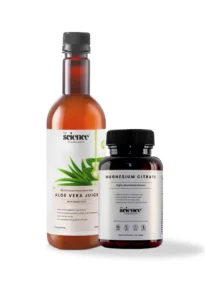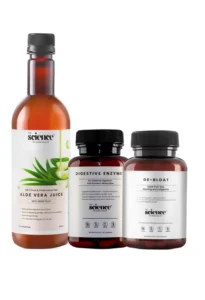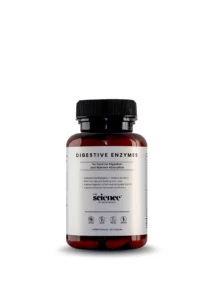Bloating can make even the simplest daily activities uncomfortable. The feeling of a swollen belly, trapped gas, or water retention is not just inconvenient, it can affect your mood, energy, and confidence. The good news is that incorporating certain foods that reduce bloating into your diet can provide effective relief while supporting overall gut health.
Millions of adults experience bloating weekly due to common triggers like overeating, poor digestion, or food intolerances. By including the right foods that reduce bloating,from high-potassium fruits to fermented gut-healing options,you can restore balance, improve digestion, and feel lighter and more energized. This article explores 15 top foods, practical lifestyle tips, and answers key questions about managing bloating naturally.
What Causes Bloating?
Understanding why bloating occurs is essential to effectively prevent it. Bloating happens when your digestive system traps gas or fluids, causing the abdomen to feel full, tight, or swollen. While occasional bloating is normal, chronic bloating can indicate underlying issues.
Common causes of bloating include:
- Overeating: Large meals can overload the stomach, delaying digestion and increasing gas production.
- Swallowing air: Eating too quickly, drinking through straws, or chewing gum introduces excess air into the digestive tract.
- Food intolerances: Lactose, gluten, or FODMAP sugars can trigger bloating in sensitive individuals.
- Gas-producing foods: Beans, lentils, broccoli, cauliflower, and carbonated drinks often produce gas during digestion.
- Gut health imbalance: Poor microbiome health can disrupt normal digestion and exacerbate bloating.
Recognizing your personal triggers and combining avoidance strategies with the right foods that reduce bloating is the first step toward long-term relief.
15 Foods That Reduce Bloating
Finding the right foods that reduce bloating is key to managing digestive discomfort and improving overall gut health. Incorporating these foods regularly can help ease gas, reduce water retention, and restore balance to your digestive system. Below is a detailed look at 15 powerful options and how they can be included in your daily routine.
High-Potassium Foods
Potassium helps regulate fluid balance in the body, reducing water retention and bloating.
- Bananas: Rich in potassium and natural electrolytes, bananas help counteract sodium-induced water retention. Eating a banana as a mid-morning snack or blending it into smoothies can prevent bloating and keep energy levels steady.
- Avocados: With their combination of fiber and potassium, avocados promote smooth digestion and reduce swelling in the abdomen. Try adding sliced avocado to salads or on whole-grain toast for a gut-friendly meal.
Fiber-Rich Fruits and Vegetables
Soluble fiber is essential for smooth digestion, supporting beneficial gut bacteria, and naturally alleviating bloating.
- Berries: Blueberries, raspberries, and strawberries are rich in antioxidants and fiber, promoting healthy gut flora. They can be added to yogurt, oatmeal, or enjoyed as a fresh snack.
- Kiwi: Contains actinidin, an enzyme that helps digest proteins efficiently. Eating kiwi after meals can reduce the likelihood of bloating and improve digestion.
- Papaya: Papain enzyme in papaya breaks down proteins, easing digestive strain. Include papaya in smoothies, fruit salads, or as a morning snack to support gut health.
- Celery: Its high water content acts as a natural diuretic, flushing excess fluids and reducing bloating. Incorporate celery sticks with hummus or juice it for a refreshing drink.
- Asparagus: Contains inulin, a prebiotic that feeds beneficial gut bacteria, promoting smooth digestion. Steamed or lightly roasted asparagus makes a simple, bloating-friendly side dish.
Gut-Healing Fermented Foods
Fermented foods provide probiotics that balance gut flora, helping to reduce gas, bloating, and irregular digestion.
- Yogurt: Rich in live cultures, yogurt aids in digestion and prevents gas buildup. Opt for unsweetened or Greek yogurt to maximize gut health benefits.
- Kefir: This fermented dairy drink is packed with probiotics, making it a powerful option to reduce bloating naturally. Drink kefir on its own or add it to smoothies.
- Kombucha: Fermented tea rich in probiotics that promotes a healthy digestive system. Sip kombucha in moderation to ease bloating while supporting gut microbiome diversity.
Anti-Inflammatory Herbs and Spices
Certain herbs and spices relax the digestive tract, reduce inflammation, and prevent bloating.
- Ginger: Stimulates digestive enzymes and speeds up stomach emptying, reducing gas buildup. Ginger tea or adding fresh ginger to meals can significantly reduce bloating.
- Peppermint Tea: Menthol in peppermint relaxes digestive muscles, easing trapped gas. Drinking peppermint tea after meals provides natural relief from bloating.
- Turmeric: Curcumin fights inflammation in the gut and supports healthy digestion. Incorporate turmeric into curries, soups, or golden milk for bloating relief.
Bloat-Friendly Whole Grains and Seeds
Whole grains and seeds rich in soluble fiber promote regular bowel movements and support gut health.
- Oats: Contain soluble fiber that absorbs water, promoting smooth digestion and preventing constipation-related bloating. Enjoy oatmeal for breakfast or add oats to smoothies and baked goods.
- Quinoa: Gluten-free and high in fiber, quinoa is gentle on the digestive system and prevents bloating caused by wheat. Use quinoa as a side dish, in salads, or as a breakfast porridge.
Tips for Maximizing the Benefits of Foods That Reduce Bloating
- Pair high-fiber fruits and vegetables with plenty of water to prevent gas formation.
- Rotate different fermented foods like yogurt, kefir, and kombucha for diverse probiotic support.
- Include at least one high-potassium food and one fiber-rich vegetable in every meal to maintain balance.
- Use anti-inflammatory herbs like ginger and turmeric daily in cooking or teas to support smooth digestion.
By consistently incorporating these 15 foods that reduce bloating, you can naturally prevent digestive discomfort, ease gas, and maintain a lighter, healthier feeling throughout the day.
Foods and Habits That Can Worsen Bloating
Avoiding triggers is as important as including foods that reduce bloating. Common culprits include:
- Cruciferous vegetables: Broccoli, cauliflower, and Brussels sprouts can produce excess gas.
- Carbonated drinks: Soda and sparkling water introduce gas into the digestive tract.
- Excess beans and lentils: These can ferment in the gut if consumed in large quantities.
- Artificial sweeteners: Sorbitol, xylitol, and other sugar substitutes can increase bloating.
- Dairy: Lactose-containing products may trigger bloating in sensitive individuals.
Lifestyle Tips to Prevent Bloating
Simple daily habits complement foods that reduce bloating for lasting relief.
- Eat slowly and chew thoroughly: Reduces swallowed air, easing gas formation.
- Stay hydrated: Water supports digestion and flushes excess sodium.
- Exercise after meals: Light movement encourages the passage of gas and prevents bloating.
- Limit straws and chewing gum: Reduces swallowed air.
- Keep a food diary: Track triggers and identify patterns causing bloating.
When to Seek Medical Help
Persistent or severe bloating may indicate underlying medical conditions. Consult a doctor if you notice:
- Sudden or unexplained weight loss
- Blood in stool
- Severe abdominal pain
- Bloating that does not improve with dietary changes
These symptoms may point to conditions like IBS, SIBO, or other digestive disorders. Early evaluation ensures effective treatment.
Conclusion
By incorporating these foods that reduce bloating into your diet and adopting mindful lifestyle habits, you can significantly improve digestion, reduce gas, and feel lighter every day.
Ready to take control of your gut health? Join Smriti Kochar’s Ultra Wellness Program,a transformative, root-cause approach that has helped people in 25+ countries heal naturally. Start your journey today and unlock the healthiest version of you, free from bloating and digestive discomfort.
Read Our Latest Blogs On Bloating & Period Health
How to Reduce Bloating Instantly | Bloated Stomach During Period | Anti-Bloating Drinks | Probiotics for Bloating | How Long Does Period Bloating Last
Frequently Asked Questions
Ans: Bananas, kiwi, papaya, and yogurt are among the fastest-acting options to relieve bloating naturally.
Ans: Yes, staying hydrated supports digestion, reduces water retention, and helps flush excess sodium from the body.
Ans: Most people benefit from fermented foods, but those with severe digestive disorders or histamine sensitivity should consult a doctor before consuming them regularly.
Ans: Incorporate them daily or multiple times per week for consistent digestive relief and gut health support.
Ans: Fiber is essential, but introducing it gradually prevents excess gas. Pairing high-fiber foods with plenty of water further reduces bloating.
Ans: Occasional bloating is common, especially after large meals. Persistent bloating requires attention to diet, lifestyle, or medical evaluation.
Ans: Yes, probiotics restore healthy gut bacteria, improve digestion, and reduce gas over time.
Ans: Peppermint tea, ginger tea, warm water, and water with lemon are natural drinks that help calm the digestive system and prevent bloating.






